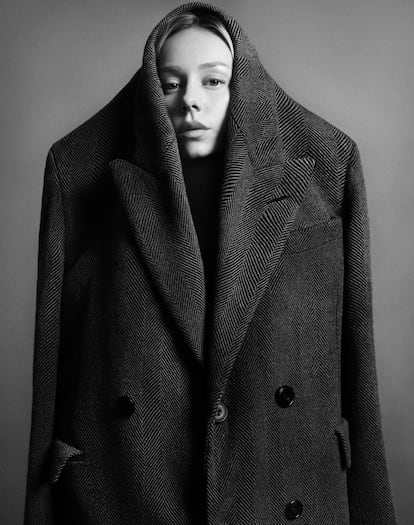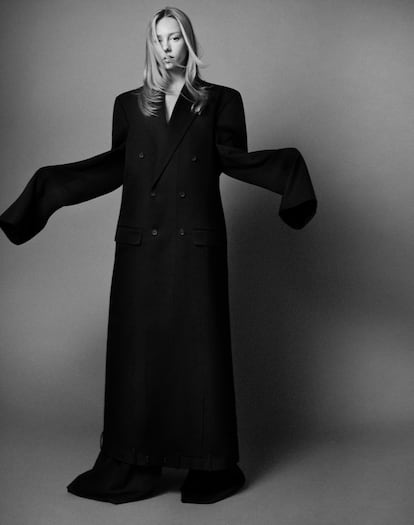Actress Ester Expósito: ‘After “Elite,” I realized I was alone’
She became famous around the world with the Netflix teen series when she was just 19 years old. Now, almost five years and 27 million fans later, she stars in auteur films and is preparing to return to the streaming platform that made her a star

If Spanish actress Ester Expósito’s life were a reality show, it would be one of the world’s most-watched television programs. Over 27 million people follow her on Instagram, and a video of the 23-year-old dancing to the remix of Rauw Alejandro’s hit song El efecto is one of the most viewed videos in Instagram’s history, racking up almost 100 million shares and 11 million “likes.” Since her time on Elite, the Netflix series in which she played Carla Roson for three seasons, she has become one of the most searched Spanish actresses on the internet. According to Netflix, over 20 million households worldwide watched the show’s first season in its first month on air. At the time, Expósito was virtually unknown and had only 5,000 Instagram followers; she gained hundreds of thousands of followers overnight. Today, she has a legion of them, on par with global stars like Spanish singer Rosalía.
“But everything has its time,” says the actress during a conversation with EL PAÍS. She’s made a stop in her native Madrid before leaving for Paris and Milan. In 2020, after three seasons playing Carla Roson, Expósito decided to leave Elite. She was at the height of her fame but felt that the time had come to close that chapter of her life. “It didn’t make sense to keep going with my character anymore. I was 20 years old, and I wanted to do new things,” she recalls. Three years later, she’s still being asked about the show. “It doesn’t bother me. I’m very fond of it and I’m very grateful. It gave me the chance to be seen all over the world, to be here and to do other projects that interest me,” she says.
Not only has she been asked a lot about Elite; she has also been offered many roles in shows that are very similar to Elite. “Since I left [the show], I’ve tried to be very selective about the projects that are presented to me. I like to do different things, to exploit all my facets,” she says. She was in Paco León’s film Rainbow; she starred in director Jaume Balagueró's Venus, a horror film; she also appeared in Javier Ambrossi and Javier Calvo’s series Veneno, and in the Manolo Caro-directed miniseries Someone Has to Die. She just attended the premiere of Lost in the Night, a film in which she stars under the direction of Mexican director Amat Escalante, in France. In the movie, she plays an influencer who triumphs on social media by recording videos in which she simulates her own suicide. The character aligns with our time, in which everyone seems obsessed with their 15 minutes of fame.
At first glance, it might seem that Expósito is also comfortable with all the attention she receives. But that’s just how it looks. “I never dreamed of being famous. I wanted to be an actress and make a living from it, but fame was not an option. At first, with the help of my parents, I was able to manage it well. But now it’s just wearing on me,” she explains. She attended the screening of Lost at Night at Cannes accompanied by her parents. “They came with me because I was shitting myself. It terrifies me and I have a hard time seeing myself on screen. I’m learning to be less obsessive, to accept and enjoy myself.”

Question. Are you very hard on yourself?
Answer. I’m very demanding, neurotic, almost obsessive. When I do something and I don’t like it, it’s hard for me to get out of that cycle. I punish myself a lot, more than I should....
Q. But people like you a lot...
A. I have no use for other people’s opinions. I really appreciate them, but they are of no use to me. I may be well-liked, but if I’m not happy with a project, it doesn’t matter what they say [about me]. The directors I work with know what I mean. For better or worse, I have the final say so I can be satisfied with it.
She has spent the past five months in Mexico filming the action-adventure series Bandidos, which is scheduled for release in 2024. In it, she plays Lilí, a girl who sets out on a quest for a Mayan treasure. It will be her return to the youth genre and to Netflix, the platform that launched her to fame five years ago. “I had my prejudices and doubts. I didn’t want to do another Elite,” she admits. “But I started reading the story and I was hooked.”

At the young age of 23, Expósito is already nostalgic for her childhood. Lately, she thinks a lot about her life before she became famous. “This summer I went back to Viveiro, my mother’s town in Galicia. Going there fuels me for the rest of the year. It’s my way of remembering that there was an Ester before all this, an Ester who enjoyed going out with her hometown friends,” she says during our conversation in her agent’s office. She was a pampered child who had a privileged childhood. The only daughter of a successful architect and a real estate manager, she never lacked for anything. However, she always dreamed of being a self-sufficient adult and leaving home. “I would see kids working in movies and TV and I would say to my parents, ‘Why can’t that be me?’ They wanted me to go to school, study and have a normal childhood,” she recalls. But in the end, she got her way. At the age of 13, she enrolled in an acting school and at 14 she already had a manager. At 16, she got her start in acting. She was part of Rodrigo Sorogoyen’s May God Save Us, although but her part was cut from the film in the final editing, and she had small roles in the series Centro médico and Locked Up (Vis a vis in Spanish). She auditioned for Elite at 17, and by 19 she was already a global star.

Q. Is adulthood what you expected?
A. No. It’s worse. I always wanted to be older, to feel older and do grown-up things. But I think I idealized adulthood and now I feel nostalgic for childhood. I’m starting to realize that my life is not going to go back to the way it was. I am dedicated to what I love, but it’s a lot of pressure. I am a person who has a lot of anxiety, and the exposure does not help me with that
Q. Have you needed to seek professional help?
A. Yes. Two years ago, I started going to therapy and it went very well. I had to stop because I was filming outside Spain, but now I would like to start again. It’s not easy to take that step: to go to a stranger and expose yourself to him and talk about what’s hurting you. But ultimately it’s positive. I have to go back because I need to manage my anxiety. I think I can handle everything, but I can’t.

Elite’s success came as Expósito was in the midst of the transition between adolescence and adulthood. She was doing what she loved best, but it came with a lot of exposure. She remembers it as an earthquake, “a whirlwind of [both] good and bad things.”
Q. Based on what you say, it was difficult for you to manage so much success so suddenly...
A. After Elite’s success, I was surrounded by constant noise: social media, job offers, people in the streets... [There were] a million stimuli that didn’t let me slow down and be introspective. I was so distracted that I couldn’t stop and think. When that noise quieted down a bit, as it did after Elite, I suddenly realized that I was alone with myself. And facing loneliness is hard. That’s when you go back to the things that hurt you in life: unresolved issues, insecurities, doubts. That’s when one’s confidence is shaken.
Q. Were you depressed?
A. Yes... I don’t know if I should call it depression, but I was alone with myself and I started to wonder who I am and who I was before all this. It was a necessary existential crisis. Before Elite, I never doubted myself. I was always very confident that I was going to be able to do and achieve anything I wanted. I guess it was a way of encouraging myself to reach my goal. After the show, my insecurities began. It’s not easy to come down from success. Stopping and being alone with yourself is dizzying. It is a sacrifice in many ways. You sacrifice money, you sacrifice projects, exposure…
There are not many Spanish actresses in the same position as Expósito, and certainly not at such a young age. In a country like Spain, where the average age of emancipation is over 30, she is independent at age 23. “I still live with my parents because I want to,” she says. In an entertainment industry like the Spanish one, where only 8.17% of actors can make a living from their profession, she is one of the lucky few. “I feel privileged because it is a tough profession. I’ve been lucky to be able to make a living in this at such an early age,” she acknowledges. Spanish actresses earn up to 40% less than actors, and only 20% of the roles are female. She compensates for these inequalities with her work in the fashion industry. “Sometimes you can earn more money with social media, but there are acting projects that fulfill me and I don’t care what I earn because I do them for the love of the profession,” she says.
Q. You were recently asked about former Spanish soccer president Luis Rubiales, and you said that he was a disgrace. Have you ever experienced that kind of machismo at work?
A. Things are better than they were years ago. But yes, I have experienced it. I see that it’s still hard to give women control and power everywhere, and that’s true in film and television as well. Most directors, screenwriters and crew members are men still and most of the stories and main characters revolve around men. We women are still decorative satellites that revolve around male stories... It’s not bad that men star in stories; the problem is that they are the majority [of the stories]. That’s why we have to keep going; we must not let up. I have been very lucky, but I see that it is still difficult for women’s ideas to be taken seriously.
Q. At the beginning you said you were very demanding of yourself. Is that true of your role as an influencer, too?
A. No, that’s like a game to me. It’s not my profession or my dream. I don’t consider myself an influencer. either. I don’t show my life or dedicate myself to being a trendsetter. Social media must be used as what it is, or it can be very toxic and dangerous. To me, it’s a showcase. I show only a very small part of my life, but not the best or worst parts. We like to be told lies and social media is a lie.

Hardly a day goes by that the media doesn’t publish a story about her. This summer there was a lot of talk about her relationship with Uruguayan actor Nico Furtado. She was also linked to singer Rauw Alejandro, Rosalía’s ex. “Many things are made up; many lies are told about me. I try to look the other way, but it makes me angry that a lie is taken as true, like when they said I was with a footballer,” she laments. “That’s the tricky part of this job. The press can be very intrusive. I can’t meet someone quietly because the paparazzi are everywhere, and they foist a boyfriend on [me]. I can’t cry quietly after a breakup, either, because I’ll read about it in the press before I can tell a friend.”
Her life is not a reality show, but sometimes it resembles one, with the paparazzi, the constant news reports, her 27 million fans... “Part of this exposure makes me anxious. Sometimes I think [about] what a drag [it is] to have to think so much about everything I do, say or post on social media,” she complains. Fame is tiring, but it also ensnares one.

Q. Are you afraid that your success is fleeting?
A. I’m afraid that interesting projects will stop coming my way. I don’t think you have to get attached to or become infatuated with fame because it can go away at any moment. But I also don’t know how I would feel if [my] success were to end.
Q. Has fame made you lonelier?
A. Yes, no one around you experiences what you do and it creates a distance, a chasm that separates you from everyone else. Fame isolates you, makes you feel alone.
Production credits
Sign up for our weekly newsletter to get more English-language news coverage from EL PAÍS USA Edition










































